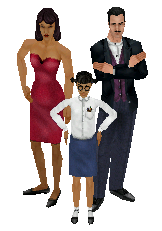The Sims
Often dismissed by so-called serious gamers, I hold the release of the first The Sims to be a groundbreaking moment in gaming history. Combining life simulation presented as a virtual dollhouse combined with intuitive architectural design, it gave an enormous amount of freedom to players through its open-ended gameplay.
As the series progressed, it evolved both in terms of graphics and gameplay. Expansion packs introduced new features, while with the release of the second game the world moved into the third dimension. This trend peaked with The Sims 3, which featured a nearly seamless open world and introduced near-limitless customization through the create-a-style function. I honestly had years of fun without even feeling the need to buy a single expansion pack. Pushing the boundaries regrettably resulted in a demanding and unstable game, leading to the fourth entry scaling back ambitions. The reduced scope, simplified gameplay and expensive piecemeal reintroduction of basic features led me to abandon the series with The Sims 4.
The Sims 1

While I hold the third entry as the technical peak of the series, the first game has two strong aspects that the other games somewhat lack.
First, it has a timeless and coherent visual design paired with an unparalleled soundtrack.
Secondly, it is cerebrally grounded in a way that later entries weren't, possibly because designer Will Wright's efforts were focused elsewhere when later games were developed. Have you ever flipped through the manual? And if so, did you notice that it comes with a recommended reading section? Fundamentally, Build Mode is underpinned by Christopher Alexander's A Pattern Language, a book that championed timeless vernacular design patterns and sought to empower ordinary people to (help) design their own houses. The reading list also includes several books on economics and psychology. For your convenience, I have transcribed the reading list:
- Home: A Short History of an Idea by Witold Rybczynski (July 1987), Penguin USA; ISBN: 0140102310
- Notes on the Synthesis of Form by Christopher W. Alexander (June 1970), Harvard University Press; ISBN: 0674627512
- A Pattern Language : Towns, Buildings, Construction by Christopher Alexander, Sara Ishikawa, Murray Silverstein (1977), Oxford University Press (Trade); ISBN: 0195019199
- Architecture: Form, Space, & Order by Frank D. K. Ching, Francis D. Ching (February 1996), John Wiley & Sons; ISBN: 0471286168
- Housing by Lifestyle: The Component Method of Residential Design by James W. Wentling (November 1994) McGraw-Hill; ISBN: 0070692939
- Time for Life: The Surprising Ways Americans Use Their Time by John P. Robinson, Geoffrey Godbey (Contributor), Robert Putnam (June 1997) Pennsylvania State University Press (Trade); ISBN: 0271016523
- Maps of the Mind by C. Hampden-Turner (March 1982), MacMillan Publishing Company; ISBN: 0025477404
- Hidden Order: The Economics of Everyday Life by David D. Friedman (September 1997), HarperCollins; ISBN: 0887308856
- Making the Most of Your Llama by Linda C. Beattie (Editor), Araneen Witmer (Illustrator), Kathyrn Doll (Editor), Dr. Linda Beattie (September 1998), Kopacetic Ink; ISBN: 0961963417
- Finding Your Perfect Love by Arthur Clark, Cassandra Skouras (January 1998), Rosebud Press; ISBN: 0965276902
- The User Illusion: Cutting Consciousness Down to Size by Tor Norretranders, Jonathan Sydenham (Translator) (April 1998), Viking Press; ISBN: 0670875791
Beyond these books, you can obviously also recognize concepts like Maslow's hierachy of needs in the way the game is designed.
Custom content
Some custom content I remember using.
- The Simarillion now only exists in incomplete archived form. M.J. Holmes presented through this site her own vision of Tolkien's world, through custom Sims content.
- C&C Enterprises I mostly recall for their reworked gardening and kitchen systems.
- Persimmon Grove
Simitone
Simitone is a project to develop a modern frontend for the first Sims game, based on work already done for the FreeSO reimplementation of The Sims Online. Development seems have stalled after complaints from Maxis.